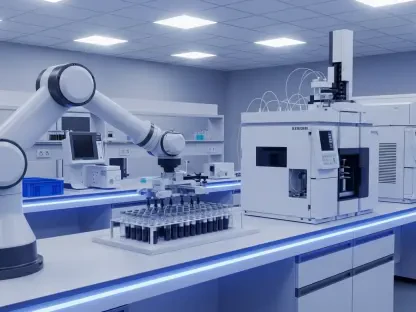In a groundbreaking development for medical science in Southern California, the University of California San Diego (UC San Diego) has been awarded an $80 million, seven-year grant from the National Center for Advancing Translational Sciences (NCATS), a division of the National Institutes of Health (NIH). This Clinical and Translational Science Award (CTSA), directed to UC San Diego’s Altman Clinical and Translational Research Institute (ACTRI), stands as one of the largest federal research grants in the university’s history. It represents a renewed commitment to advancing health innovation, marking the fourth consecutive CTSA for ACTRI since its establishment. The funding aims to revolutionize clinical research by accelerating the journey from scientific discovery to patient care, broadening access to cutting-edge therapies, and fostering the next generation of health research leaders. This substantial financial boost positions UC San Diego at the forefront of translational science, promising significant impacts on both regional and national levels. As this initiative unfolds, it sparks curiosity about how such a transformative grant will reshape health outcomes and research practices over the coming years.
Pioneering Translational Science
The core mission of the $80 million grant is to expedite translational research, a process that transforms laboratory breakthroughs into practical medical solutions. Under the guidance of Davey Smith, M.D., assistant vice chancellor for clinical and translational science at UC San Diego Health Sciences, ACTRI is set to streamline this journey. The focus is on leveraging advanced technologies such as artificial intelligence and molecular biology to reduce the often lengthy timeline of bringing new treatments to patients. This is particularly vital in high-stakes fields like neurology and infectious diseases, where delays can mean the difference between life and death. By prioritizing speed and efficiency, the institute aims to ensure that scientific discoveries do not languish in labs but instead reach those in need with unprecedented urgency. This approach signals a shift toward a more dynamic and responsive research model that could set new standards for how medical innovations are developed and deployed across the healthcare landscape.
Beyond the technological advancements, the grant’s emphasis on translational science also addresses systemic challenges in the research-to-treatment pipeline. Historically, many promising discoveries fail to make it to clinical application due to funding shortages, regulatory hurdles, or lack of coordination. ACTRI’s strategy involves not only harnessing cutting-edge tools but also refining the processes that govern research. This includes fostering environments where data sharing and interdisciplinary collaboration can thrive, breaking down silos that often stall progress. The institute’s past successes in accelerating therapies for complex conditions demonstrate its capability to lead in this arena. With this funding, there is an opportunity to scale these efforts, potentially impacting a wider array of health issues. This comprehensive approach to overcoming barriers ensures that the path from discovery to delivery becomes not just faster, but also more reliable and accessible to diverse patient populations.
Strengthening Regional Collaboration
A significant aspect of this grant’s impact lies in its ability to enhance collaboration across Southern California. ACTRI is expanding its network of partner institutions, welcoming new collaborators such as Eisenhower Health, Rady Children’s Hospital, the VA San Diego Healthcare System, and El Centro Regional Medical Center. These join an established group including the Salk Institute for Biological Studies and Sanford Burnham Prebys, forming a powerful coalition dedicated to advancing health research. As one of 60 CTSA hubs nationwide, ACTRI plays a pivotal role in coordinating resources and expertise among these entities. This collaborative framework is designed to increase access to clinical trials and innovative therapies, ensuring that a broader swath of the population benefits from the latest medical advancements. The focus on regional partnerships underscores a commitment to making health research more inclusive and impactful.
This expanded network also facilitates a more integrated approach to tackling health challenges unique to the region. By pooling resources and sharing data, these institutions can address issues ranging from pediatric care needs to veterans’ health concerns with greater efficiency. For instance, Rady Children’s Hospital brings specialized expertise in child health, while the VA system focuses on the specific medical needs of military personnel. Such diversity in focus within the network allows for tailored research initiatives that resonate with distinct community segments. Michael Hogarth, M.D., co-principal investigator of the CTSA, has emphasized the importance of data integration in streamlining research processes across these partners. This model of cooperation not only amplifies the reach of clinical studies but also sets a precedent for how collaborative ecosystems can drive health innovation on a larger scale, potentially influencing national research strategies.
Cultivating Future Health Leaders
Workforce development stands as a critical pillar of the grant’s objectives, with ACTRI prioritizing the training of future health researchers and innovators. Programs such as the K12 fellowship for early-career scientists provide structured mentorship and resources, helping emerging professionals navigate the complexities of translational research. Additionally, the Creating Dedicated Scientists through Research Education (CADRE) initiative targets community college students, introducing them to research opportunities and broadening the talent pool. These efforts are complemented by boot camps and leadership academies that equip participants with practical skills and strategic insights essential for driving medical breakthroughs. By investing in talent at various career stages, the institute ensures a sustainable pipeline of skilled individuals ready to address evolving health challenges over the coming years.
The emphasis on inclusivity in these training programs adds another layer of significance to ACTRI’s mission. By supporting diverse groups, including students from underrepresented backgrounds and veterans transitioning into health careers, the institute fosters a research community rich in varied perspectives. This diversity is crucial for innovation, as it brings fresh ideas and approaches to solving complex health problems. Leadership training further prepares participants to take on influential roles, ensuring that the next generation is not only technically proficient but also strategically adept at navigating the healthcare landscape. The long-term impact of these initiatives lies in their ability to create a ripple effect, where trained individuals go on to mentor others, perpetuating a cycle of growth and advancement in health science. This comprehensive approach to workforce development positions UC San Diego as a nurturing ground for the leaders who will shape the future of medicine.
Prioritizing Community Health Outcomes
Community impact is a cornerstone of ACTRI’s work, with the grant enabling research that addresses both global advancements and local needs. The institute has a proven track record of leading trials for transformative therapies, such as the first gene-targeted treatment for ALS, while simultaneously focusing on regional issues like food security and wastewater surveillance. These dual priorities ensure that the benefits of cutting-edge research are not confined to academic or clinical settings but are felt directly by communities, particularly those often overlooked in medical studies. By aligning scientific efforts with societal needs, ACTRI fosters trust and demonstrates a commitment to improving health outcomes where they are most urgently required. This balance of global and local focus is a defining feature of the institute’s approach to health research.
Moreover, the grant supports initiatives that tackle specific environmental and public health crises affecting Southern California. Projects addressing sewage concerns in the Tijuana River or health issues like Gulf War illness highlight ACTRI’s responsiveness to pressing regional challenges. These efforts are particularly impactful for underserved populations and border communities, where access to advanced care and research participation has historically been limited. The institute’s involvement in COVID-19 vaccine studies in these areas further exemplifies its dedication to equity in health advancements. By ensuring that research translates into tangible improvements in people’s lives, ACTRI not only advances science but also builds stronger, healthier communities. This community-centered philosophy amplifies the grant’s potential to create lasting change, bridging the gap between innovation and real-world application in meaningful ways.
Setting a National Standard for Research
The broader implications of this funding extend to setting a national benchmark for collaborative health research. Leaders like John Carethers, M.D., vice chancellor for Health Sciences at UC San Diego, have articulated a vision of building an equitable research ecosystem that integrates data and resources across institutions. This grant empowers ACTRI to refine research processes, making them more scalable and efficient, which could serve as a model for other regions. The institute’s role as a coordinating hub under the CTSA program amplifies its influence, allowing it to share best practices and innovations with other hubs nationwide. This positions UC San Diego as a leader in shaping how translational science is conducted, potentially influencing policy and funding priorities on a larger scale.
Additionally, the strategic expansion of ACTRI’s network and resources reflects a modern approach to addressing complex health challenges. By prioritizing efficiency through shared data systems and interdisciplinary partnerships, the institute aims to reduce redundancies that often plague research efforts. This focus on streamlined operations is particularly relevant in an era where health crises demand rapid responses. The grant’s support for such initiatives ensures that UC San Diego remains at the cutting edge of health science, driving advancements that benefit not just Southern California but the entire nation. The ripple effects of this work could inspire similar collaborative models elsewhere, reinforcing the importance of integrated research ecosystems in tackling the multifaceted health issues of today and tomorrow.
Advancing Equity in Health Innovations
A fundamental goal of the $80 million grant is to ensure that health advancements reach all segments of society, especially those historically underrepresented in medical research. ACTRI’s community-driven projects, such as studies on environmental health risks and vaccine trials in border regions, underscore a deep commitment to equity. These initiatives address disparities by bringing research opportunities and innovative care to areas where they are most needed. This approach not only enhances the relevance of scientific work but also builds trust among diverse populations, ensuring that health solutions are tailored to real-world challenges faced by different communities across Southern California.
Furthermore, the focus on equity extends to how research is conducted and who benefits from its outcomes. By engaging with a wide array of regional partners, ACTRI ensures that clinical trials and therapies are accessible to a diverse demographic, reflecting the true makeup of the population. This inclusivity is critical for developing treatments that are effective across varied genetic and socioeconomic backgrounds. Past efforts, such as addressing local health emergencies and supporting underrepresented groups in research participation, highlight the institute’s role as a champion for fair access to medical progress. The grant’s backing of these priorities promises to deepen the impact of health innovations, creating a framework where equity and science advance hand in hand, ultimately benefiting society as a whole.
Reflecting on a Transformative Milestone
Looking back, the awarding of the $80 million CTSA to UC San Diego’s Altman Clinical and Translational Research Institute marked a defining moment in the landscape of health research. This funding catalyzed advancements in translational science, strengthened regional collaborations, and nurtured a new cadre of health leaders through targeted training programs. The institute’s dedication to community health and equity reshaped how research addressed both local and global needs, setting a powerful example for others to follow. As the impact of this grant unfolded, it became evident that UC San Diego had solidified its standing as a beacon of innovation. Moving forward, the focus should remain on sustaining these collaborative networks and expanding community outreach to ensure lasting benefits. Exploring ways to replicate this model in other regions could further amplify the strides made, paving the way for a future where health research consistently aligns with the diverse needs of society.









